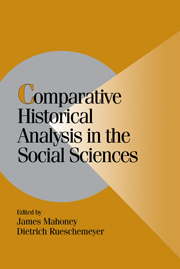Book contents
- Frontmatter
- Contents
- Contributors
- Preface
- Introduction
- I Accumulation of Research
- II Analytic Tools
- 5 BIG, SLOW-MOVING, AND … INVISIBLE
- 6 HOW INSTITUTIONS EVOLVE
- 7 USES OF NETWORK TOOLS IN COMPARATIVE HISTORICAL RESEARCH
- 8 PERIODIZATION AND PREFERENCES
- III Issues of Method
- Conclusion
- Index
- Cambridge Studies in Comparative Politics
- References
8 - PERIODIZATION AND PREFERENCES
REFLECTIONS ON PURPOSIVE ACTION IN COMPARATIVE HISTORICAL SOCIAL SCIENCE
Published online by Cambridge University Press: 05 June 2014
- Frontmatter
- Contents
- Contributors
- Preface
- Introduction
- I Accumulation of Research
- II Analytic Tools
- 5 BIG, SLOW-MOVING, AND … INVISIBLE
- 6 HOW INSTITUTIONS EVOLVE
- 7 USES OF NETWORK TOOLS IN COMPARATIVE HISTORICAL RESEARCH
- 8 PERIODIZATION AND PREFERENCES
- III Issues of Method
- Conclusion
- Index
- Cambridge Studies in Comparative Politics
- References
Summary
The Garden of Eden with the Fall of Man, a remarkable painting jointly executed circa 1615 by two painters with very different styles, hangs in the Mauritshuis in The Hague. A standing Eve, offering the apple, and a seated Adam, receiving it, both in the left foreground, were portrayed figuratively by Peter Paul Rubens. The lush garden in which they are placed, an overwhelming background filled with dense flora and the prolific animal kingdom against which the protagonists and their act of exchange stand out, was painted by Jan Breughel the Elder, Pieter Breughel the Elder's second son and friend to Rubens. This collaboration, the best example I know in the visual arts of an oscillation and combination of perspectives and methodologies in a single work, is a performance of analytical history. Marking the critical moment when a single exchange disenchanted the world and transformed the status of humankind inside nature, it is, like the best historical social science, a work about a particular time, setting, and choice, a perceptible narrative constituted by a story of periodization and an account of preferences.
What I wish to say about the vitality and possibility of comparative historical scholarship is contained in this canvass, or at least suggested by it. Macrohistorical scholarship tilts in the direction of periodization. This rich vein of learning, with a lineage in Marx's story of epochal transformations and class-based agency and in Weber's combination of “objective probability” with sequences and patterns of purposeful action composing what he called sources of “adequate causation,” primarily offers large structure analyses of long-term processes marked by titanic transformations.
- Type
- Chapter
- Information
- Comparative Historical Analysis in the Social Sciences , pp. 270 - 302Publisher: Cambridge University PressPrint publication year: 2003
References
- 92
- Cited by



